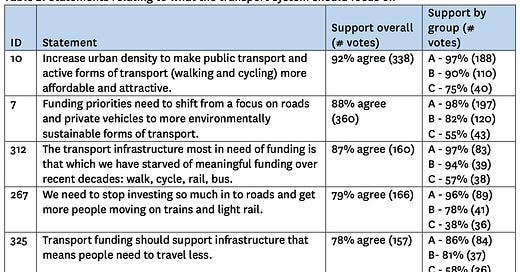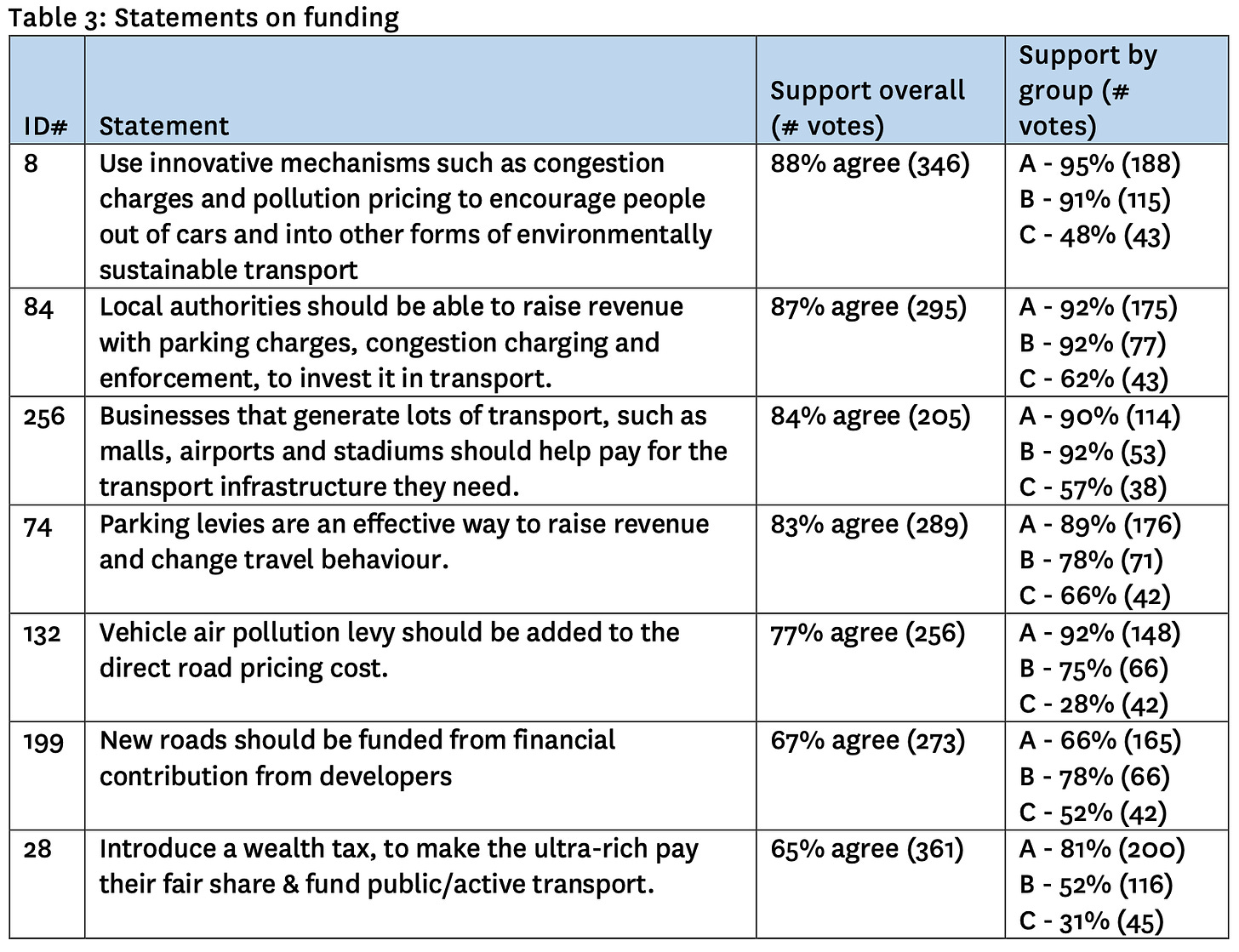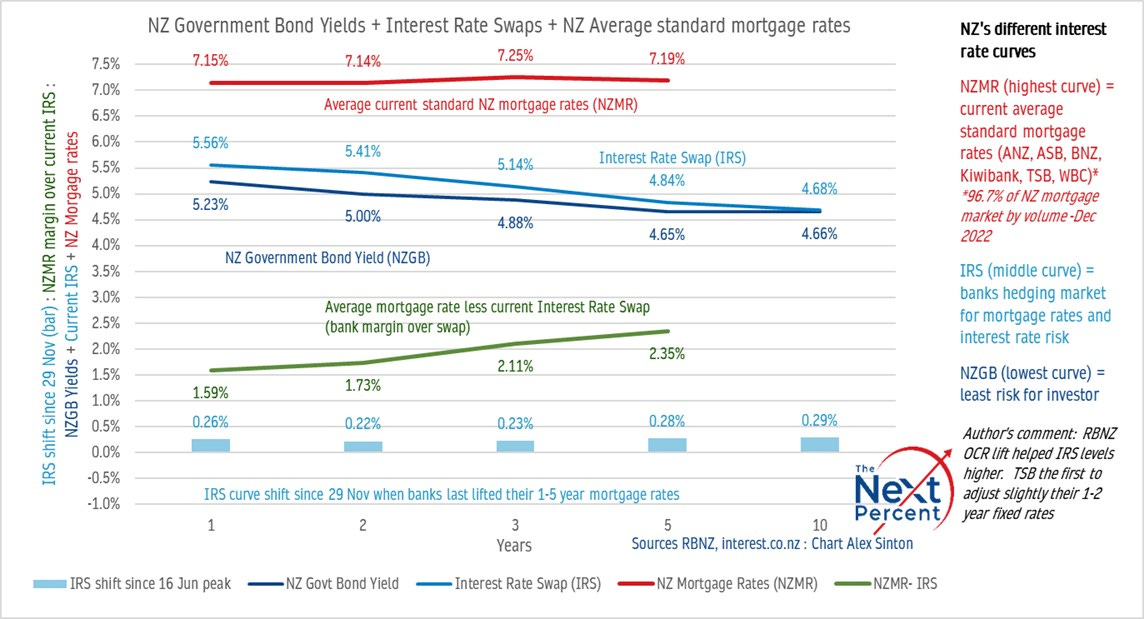TLDR: A survey ordered by the Ministry of Transport has found more than 80% of young people wanted a wealth tax, congestion charges and/or pollution pricing to pay for improvements in public transport, walking and cycling, rather than only through fuel taxes, as is the case now.
However, the University of Auckland survey of over 400 people late last year also found less than a third of older respondents wanted a wealth tax and barely a half wanted congestion charges, pollution pricing or increased contributions from developers.
The Ministry of Transport said it did not suggest the taxes to the surveyers and was not “at this stage” suggesting such measures. Transport Minister Michael Wood batted the question back to the Ministry yesterday in the article on the survey by Thomas Coughlan for NZ Herald-$$$, but National Finance Spokeswoman Nicola Willis suggested Labour was still eyeing up some sort of wealth tax.
There’s more detail and analysis on the survey below the paywall fold for paying subscribers and in the podcast above. I’ve taken the liberty of opening this one up to all immediately, given the public interest in how to fund emissions reduction and housing affordability. Many thanks again to paying subscribers for their support to allow me to do this sort of public interest journalism in public.
Elsewhere in the news overnight
National Finance Spokeswoman Nicola Willis announced this morning she had written a letter to the Finance and Expenditure Select Committee to ask for a Parliamentary Select Committee Inquiry into retail banking regulation and competition after Reserve Bank Chief Economist Paul Conway said he thought a Commerce Commission market study into the sector would be worthwhile;
ACC and Pharmac Chair (and former Labour Minister) Steve Maharey offered to resign after writing a column for Stuff that criticised the Opposition, but that appeared not to have been read by either ministers or the Opposition. Health Minister Ayesha Verrall, who sacked Rob Campbell as Te Whatu Ora Chair last week for his repeated critique of National and its leader Christopher Luxon, said the two cases were different because Maharey was truly contrite, although she is still waiting on advice about whether Maharey should go too;
Dunedin Hospital announced last night it had postponed all operations because of staff shortages and a busy emergency department, RNZ reported, while Isaac Davison reported for NZ Herald this morning that hospital patients in Auckland were being held in cafes while they waited for treatment, with one ED at 195% capacity (and it’s only March);
Public Service Minister Andrew Little is set to announce a change in the three-year-long pay freeze for the highest paid public servants later today, Stuff's Anna Whyte reported this morning, while Newshub’s Jenna Lynch reported that the exceptional circumstances clause had been used to give pay increases to 427 public servants earning more than $100,000 per year between April and November last year;
The Government is backing away under new PM Chris Hipkins from proposals to lower the voting age to 16, Glenn McConnell reported for Stuff this morning;
China’s new foreign minister Qin Gang ramped up an attack on US foreign policy overnight, accusing the United States of operating double standards and “hysterical neo-McCarthyism” that was hurting relations between the two super-powers; Politico
The Reserve Bank of Australia hiked its cash rate for a 10th consecutive meeting to an 11-year high of 3.6% as expected last night, but it opened the door for a pause in May after just one more hike because it said inflation had peaked and was cooling down. If it were to pause, it would mean Australia’s official rate would peak below 4.0% next month, while the Reserve Bank of New Zealand is still hiking towards a peak of 5.5% later this year; and,
Federal Reserve Chair Jerome Powell said this morning the US central bank might have speed its rate hikes back up to 50 basis points per meeting from 25 basis points because inflation remained too strong, which drove down stock and bond prices in New York this morning.
A generational clash over paying for public transport
A survey done for the Ministry of Transport by the University of Auckland late in 2022 has been uncovered by Thomas Coughlan for NZ Herald-$$$ via OIA requests that shows younger voters would much prefer wealth taxes, congestion charges and higher development contributions to pay for better public transport and mode shift. However, the same survey shows older voters are not keen at all on higher taxes to pay for these changes.
The self-selecting survey of 436 people in October and November by the University’s Koi Tū: The Centre for Informed Futures using pol.is found a range of ideas on how to develop public transport and how to pay for it. The survey was of ‘stakeholder groups’ who understood the issues, and therefore may have been skewed towards public transport users and advocates, the survey report writers said.
The engagement did not attempt to achieve representativeness in the participant sample; rather it focused on stakeholder groups, many of whom would have knowledge of or interest in how the transport system is evolving.
The majority (93%) of participants were between 26 and 64 years of age (fairly evenly spread between 26-39 and 40-64 year brackets) and 60% were male. With regard to transport modes, about a quarter of participants (24%) regularly used a bicycle, scooter or other personal transport mode, and walking was a regular transport mode for 19%.
While it is likely that most people use private vehicles to some extent, only 48% of respondents signalled that cars were their ‘main’ mode of transport. Most (82%) live in suburban or urban areas of New Zealand. A total of 436 people voted on (agreed or disagreed with, or passed on) at least one of the 106 statements that were moderated into the ‘discussion’. Koi Tū survey.
Here’s the key tables of the results of the survey, with group A being mostly younger respondents with less than a third using cars, group B in the middle and group C being older respondents, two-thirds of which used cars to get around.
Transport Minister Michael Wood’s office was quoted in Thomas’ piece as referring questions back to the Ministry, while the Ministry said it had not suggested the wealth tax idea.
Willis was quoted as saying even studying such options was wasteful (bolding mine):
“How loosey-goosey have contracting arrangements got that public money is being used to poll people on a wealth tax that the Government promised it wouldn’t be implementing.
“You’ve got to ask, what went wrong here. Either they got the ‘wink, wink, nudge nudge from public officials’ who thought that there was appetite for a range of new taxes - or they’ve gone off on a new foray and if that is the case, public officials should be asking for their money back.” Nicola Willis via NZ Herald-$$$
So what? Is it a dodgy survey?
In my view, the survey results show the huge appetite for changing how public transport and mode shift is done among young city-dwellers, while older home-owners in suburbs and provincial towns are just fine with the status quo. This survey was not a representative survey done in a non-self-selecting way online, so it can’t be said to represent the views of most voters, even in each age group.
But even the mere mention of these options was enough to light up the third rails of Aotearoa’s political economy around wealth taxes and repurposing roads and fuel taxes for mode shift and public transport. This is now the culture war of our age. For now, Ford Ranger Man is winning because the politicians of both National and Labour who understand how to win MMP elections know there are more swinging median voters who are older and own homes in suburbs and provincial towns than there are non-car-driving renters in the big cities who vote. That won’t change until the electoral demographics change, which would require more than 500,000 non-voting young renters to vote, and for several hundred thousand older swinging voters to not vote.1
The survey is titled: The Future of Transport - Who Should Pay for What - Polis Analysis and is available on Scribd for free to those who register.
Scoops and essential longer reads and listens
The meter is still running - Glenn McConnell reported for Stuff this morning that the $8,000 a day board set up for the now-not-being-merged TVNZ-RNZ combination is still operating.
Time to sell (the cars) - Martin Van Beynen and Poppy Clark reported for The Press this morning that the champagne lifestyle appears to be over for Christchurch-based Townhouse King Matthew Horncastle, who controls Williams Corp, which has been the biggest developer and builder of townhouses close to Christchurch’s central city. He has put his 2019 black McLaren, a white Rolls-Royce and G3 Mercedes up for sale via Instagram.





Charts of the day
Via Reuters
A fun thing
Ka kite ano
Bernard
Perhaps for reasons of old age causing them to pass on to the non-voting realm.



















Share this post